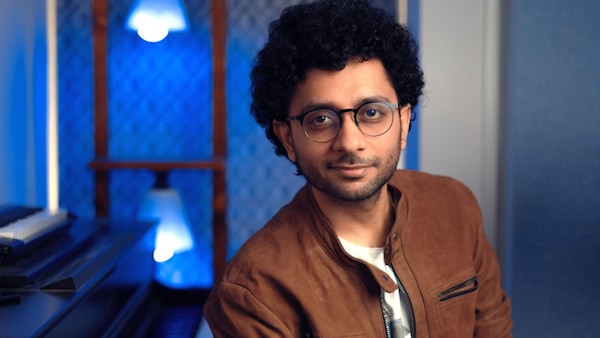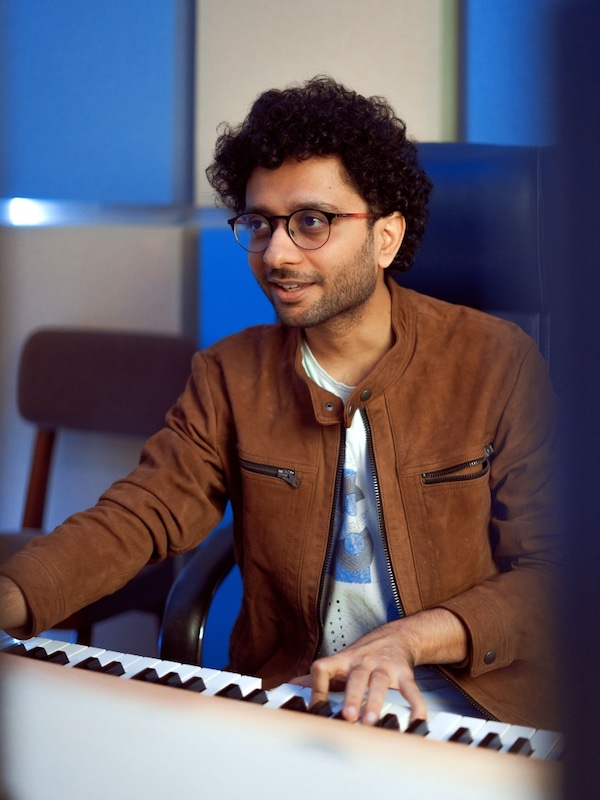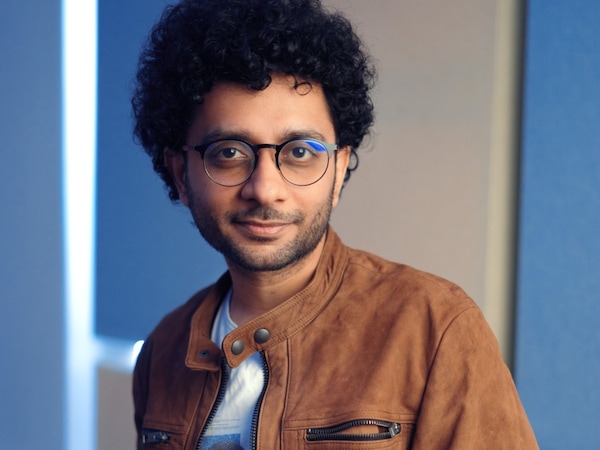Exclusive! Parag Chhabra: It was our priority to make the Good Luck Jerry album work beyond the narrative
The music composer of Good Luck Jerry tells why he doesn’t mind being addressed as an AR Rahman fanboy and discusses the various challenges of working on a black comedy

Last Updated: 12.42 AM, Aug 11, 2022
Indore-born composer Parag Chhabra describes himself as an AR Rahman-admirer first and musician next. Having passed out of the composer’s institute in Chennai, Rahman made Parag a constant feature in his gigs and eventually a music producer in his studio. Having worked extensively with AR Rahman over the last decade, he’s now in pursuit of finding his own voice as a composer.
Striking a handsome balance between his Hindustani music leanings and his in-depth understanding of Western pop, Parag is making the best of both worlds. This precisely explains why his music is so rich beyond its flamboyant exterior. Music isn’t what you remember first in a dark-comedy generally, but the young bloke commands our attention in Good Luck Jerry, starring Jahnvi Kapoor.
The musician got the major break of his career with the Siddharth Sen directorial that released on Disney+ Hotstar. From an electrifying Mor Mor to a foot-tapping Paracetamol and a healer like Jhand Ba, the album is like a musical well that keeps giving. OTTplay.com got in touch with him for a free-wheeling chat recently.
Home, Indore and early musical influences:
I spent a major part of my early years at Indore. I started off as a singer in a handful of reality shows. I was learning Hindustani classical from 12-13 but few years down the line, my orientation shifted to what was happening behind the voice. I was fascinated by arrangement, tune-writing, composition and other technical aspects. I remember Rang De Basanti released back then and it blew my head. It made me move towards music creation over execution. The influence of AR Rahman convinced me to take a plunge into music direction. I finished my engineering in Pune later.
Moving beyond the classical leanings and making a mark as a commercial composer:
After learning Hindustani for four-five years and getting into music composition, I realised my melodies didn’t have breathing space and were getting enclosed in raag-based phrases. I realised I need to put my classical leanings behind briefly and explore the pop-side to music. Learning keyboard and trying to understand Western music in depth, really helped me at that stage. Five years into music composing, I felt the need to reconnect with my classical roots again and find the soul in my music. I think I was also matured enough as musician to bring a pop flavour to classical music.

The influence of AR Rahman on his musical sensibilities, being part of his troupe and finding his own identity:
I never thought I was qualified enough to work for Rahman sir. My only dream was to meet him and tell how big an admirer I’ve been. When I was studying western classical music at his college, AR Rahman spotted me as a vocalist in one of the functions. He got me on-board as a vocalist for his gigs and over time, I gathered the courage to show my work. He was impressed and told I could begin programming for him right away (as a music producer in his studio).
It was an extremely hectic phase. He has so much energy and it was hard to cope up with his intensity as a professional. The learning was immense and layered - sitting by his side, going through his compositions, observing the way he records his singers. He’ll teach you something and it’ll take years to realise its significance.
I owe my entire musical journey to AR Rahman sir. He’s my life guru and the very reason I took up music composing at the first place. I idolise him a lot. After a point, it was also necessary to detach from him. I was working with him so closely and it was important for me to come out of that space and find my own musical expression.
The challenge of composing music for a black comedy like Good Luck Jerry:
Good Luck Jerry was a very big responsibility because it was produced by Aanand L Rai. He and director Siddharth Sen trusted me with the entire album. It was a joy working with Raj Shekhar, he’s a phenomenal lyricist. The film is a dry comedy and it was important for us to make it juicy, that’s where our craft had to come into play. Our focus was to hit the underlined emotion in every situation though it may not be very obvious in the film given the treatment. The first song in the film, for instance, is Cutie - it captures her transformation from a cute girl into a ‘jogan’.
The influence of Kolamaavu Kokila and Anirudh Ravichander over Good Luck Jerry:
It was very intentional that I never saw the film or heard the original album. It would’ve become tough for me to do my bit with those influences because I’m sure Anirudh would’ve done a great job at it. I thought I should start fresh. Even the director Siddharth Sen had tweaked the script to a level that the film had a different identity. I would call this film more an adaptation than a remake. He has just borrowed the central idea of the original and took it over from there. Our approach with the music was also similar.
Making Good Luck Jerry work as a standalone album beyond the narrative:
It isn’t always the director’s priority to think about the individualistic expression of a song. He focuses more on the film. I and Raj Shekhar had to make sure the songs need to work beyond the narrative too. On a deeper level, it was important to have repetition of choruses like ‘Mor mor’ or ‘dhol dhol’ that you can hum along. Having someone like a Jubin Nautiyal also helps because he’s not only a fabulous singer but is extremely popular - so it is bound to work as an independent entity too. We followed a mix and match strategy throughout the album. I could put so much thought into the album only because of Siddharth and Aanand sir and they gave me incredible amount of creative freedom. It was always a very collaborative space and we never thought of commerce too much.

The association with lyricist Raj Shekhar:
Raj Shekhar is the primary reason I was in the film, he happened to listen to my work and introduced me to Siddharth, Aanand sir and others. There’s more to lyric writing than poetry, there’s a lot of musicality involved. You need to write to a pulse, set to a meter; he nails it and how! He’s one of a kind and strikes the balance between the poetry and musicality beautifully. He understands cinema on a deep level - his inputs were so crucial for the music to blend with the narrative so seamlessly.
Breaking the myths of a quintessential Punjabi music album with Good Luck Jerry:
I think I didn’t break it intentionally, it was probably a product of artistic ego, the desire to prove something to people and also facilitate my independent expression. It’s a mixture of many factors. I, honestly, don’t mind doing conventional music and wouldn’t want to limit myself with the experimental stuff.
The need for a balance between narrative-based music and song-dance routine in Hindi cinema:
The industry had changed for the better in the last decade. Earlier there was no space for narrative-based music. Now, there’s an overdose of it that it has made people crave for the song-dance routine again. The identity of Indian cinema lies in its song-driven narratives; there’s no point copying the West. These are times when they are trying to ape us. The need of the hour is a good balance of everything - both the narrative-based music and the song-routine. Nothing should overpower each other.
Subscribe to our newsletter for top content, delivered fast.

